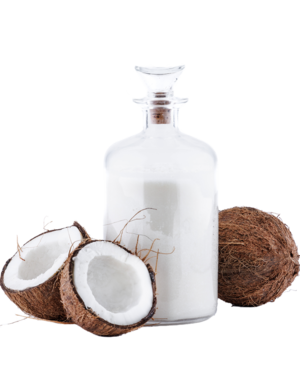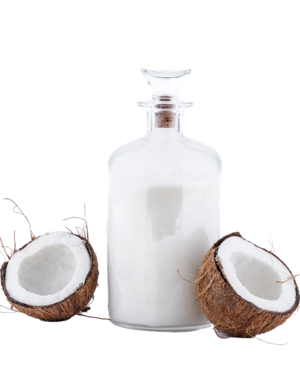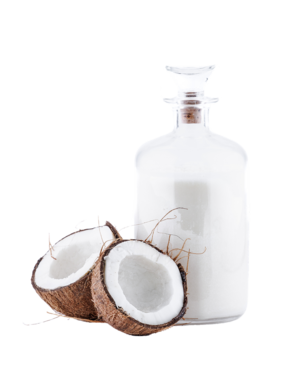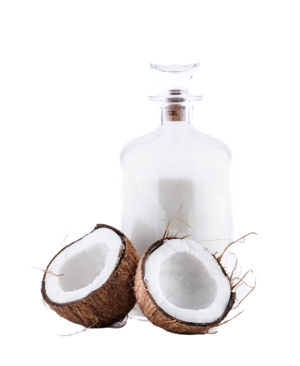Our Coconut oil qualities
We carry Coconut oil in the following qualities for you
Usage
|
Cosmetics |
Food |
Pharmaceutics |
|
|---|---|---|---|
| Coconut oil refined Ph. Eur. | |||
| Coconut oil hydrogenated | |||
| Organic coconut oil refined | |||
| Organic coconut oil virgin |

Coconut palm & coconut
The coconut palm (Cocos nucifera) belongs to the palm family and has been cultivated for over 3000 years. The fully-grown palms can grow up to a height of 20 - 25 m, occasionally even higher. The completely unbranched trunks do not bear a crown, but a dense crest with large leaves. The crest can consist of up to 30 pinnate leaves, which can be between 3 and 7 m long. A coconut palm tree flowers continuously throughout the year, once it has reached an age of 6 to 7 years. It forms inflorescences with up to 40 female and 10,000 male flowers. Pollination can be carried out by insects or by the wind. For this reason, the coconut palm also carries coconuts of different stages of ripeness throughout the year. The coconut, which is botanically a stone fruit, is surrounded by a thick, leathery layer of fibers. Therefore, the whole fruit is between 20 and 30 cm long and weighs about 1 – 2.5 kg.
The triangular, head-sized, still green coconuts are harvested either from the ground with knives attached to long sticks or by climbing up. At the ground, the thick layer of fibers is removed and the hard brown shell is broken open. The inner cavity of the coconut contains up to 1 liter of a sweetish liquid called coconut water. This is almost fat-free and is surrounded by the white, 1 to 2 cm thick pulp, also known as copra. The copra contains between 45 - 50% water, which is why it must first be dried to a maximum of 5%. The fat content is 63 - 70%. Coconut oil is obtained by crushing the dried copra and pressing it.
The ideal climate for coconut palms is an average annual temperature of 27°C with high rainfall of 1000 to 5000 mm annually, with an optimum of 1200 to 2300 mm. The temperature must not fall below 20°C, otherwise the palm tree will not flower. This climate prevails between 15° north and south latitude. Occasionally the cultivation takes place up to 26° northern and southern latitude.
After 15 years, the coconut palms reach their peak performance and an average of 30 - 40 ripe fruits per palm can be harvested per year, under optimal conditions up to 80 fruits per year.
Per hectare there are harvests of 9,000 to 12,000 fruits per year.
Coconut palms reach a maximum age between 100 and 120 years. In optimal locations, coconuts grow continuously on the palms for up to 80 years.
Would you like to be informed about the general market situation of Coconut oil and our other products?
subscribe to market reportCultivation & yield
The main growing countries along the entire tropical belt are Indonesia, the Philippines and India. Other growing areas are Sri Lanka, Brazil, Vietnam, Papua New Guinea, Mexico and Thailand. The coconut palm is thermophilic and cannot tolerate frost. For this reason, the main areas of cultivation are located near the equator in the warm and humid tropics.
Coconut palms supply about 8% of the total world plant demand. In 2018, the global coconut harvest was 61.9 million tons.

Background / history
Unfortunately, the exact origin of the coconut palm cannot be determined. South America, the South Sea Islands or the Indonesian area are possible. The coconut plant spread so far, because it has been proven that coconuts can drift 4500 km germinate with the sea current. The coconut palm has been used for over 3000 years.
The English captain Boyd brought the first coconuts to England in 1820, although coconut palms had been cultivated according to plan by Dutch and Portuguese colonies since 1740.
25,000
kg
Tank truck
900
kg
IBC
180
kg
Drum
25
kg
Bucket
25
kg
Box
General durability: IBC, bucket & box 12 months, drum 18 months
Nutritional values & composition
| Nutritional value | (per 100g) |
| Energy | 3,700 kJ / 900 kcal |
| Fat | 100 g |
| Saturated fatty acids | 91 g |
| Monounsaturated fatty acids | 7 g |
| Polyunsaturated fatty acids | 2 g |
Fatty acids ratio
Composition
| C12:0 Lauric acid | 40 – 52 % |
| C14:0 Myristic acid | 13 – 22 % |
| C18:1 Oleic acid | 3 – 12 % |
| C18:2 Linoleic acid | max. 4 % |
You want to buy Coconut oil?
Request now free of charge and without obligation from Gustav Heess. We deliver Coconut oil ...
- worldwide
- fast
- reliable
We offer Coconut oil in the following packaging units:
-
25,000
kg
Tank truck -
900
kg
IBC -
180
kg
Drum -
25
kg
Bucket -
25
kg
Box



